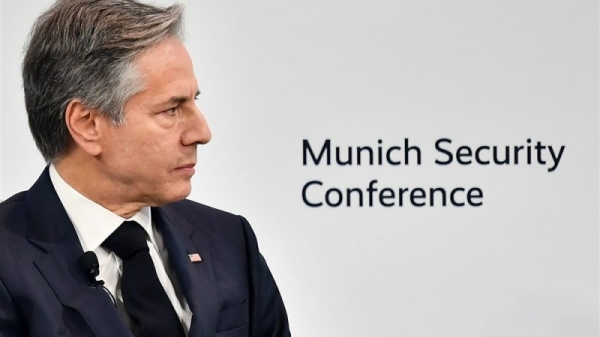In meeting, Blinken warns China’s Wang Yi against aiding Russia in Ukraine

US Secretary of State Antony Blinken on Saturday (18 February) warned top Chinese diplomat Wang Yi of consequences should China provide material support to Russia’s invasion of Ukraine, saying in an interview after the two met that Washington was concerned Beijing was considering supplying weapons to Moscow.
The top diplomats of the two superpowers met at an undisclosed location on the sidelines of a global security conference in Munich, just hours after Wang scolded Washington as “hysterical” in a running dispute over the US downing of a suspected Chinese spy balloon.
U.S. Secretary of State Antony Blinken met top Chinese diplomat Wang Yi on the sidelines of a global security conference in Munich. Blinken told Yi that the balloon incident must never happen again https://t.co/navdXzA6Wg pic.twitter.com/JbbrZ4PKGJ
— Reuters (@Reuters) February 19, 2023
Relations between the two countries have been fraught since Washington said China flew a spy balloon over the continental US before American fighter jets shot it down on President Joe Biden’s orders. The dispute also came at a time when the West is closely watching Beijing’s response to the Ukraine war.
In an interview to be aired on Sunday morning on NBC News’ “Meet the Press with Chuck Todd,” Blinken said the United States was very concerned that China is considering providing lethal support to Russia and that he made clear to Wang that “would have serious consequences in our relationship.”
“There are various kinds of lethal assistance that they are at least contemplating providing, to include weapons,” Blinken said, adding that Washington would soon release more details.
Wang told Blinken the United States must “face up to and resolve the damage” to bilateral relations “caused by the indiscriminate use of force”, according to a brief statement on Sunday by China’s Ministry of Foreign Affairs.
Wang was referring to the recent shootdown of what the United States called a spy balloon but Beijing said was a weather-monitoring craft.
Speaking to reporters in a briefing call, a senior State Department official said China was trying to “have it both ways” by claiming it wants to contribute to peace and stability but at the same time taking “concerning” steps to support Russia’s invasion of Ukraine.
Blinken “was quite blunt in warning about the implications and consequences of China providing material support to Russia or assisting Russia with systematic sanctions evasion,” the senior official said, speaking on the condition of anonymity.
The State Department’s readout of Blinken’s meeting with Wang https://t.co/l8i24ZjJt2 pic.twitter.com/8VTrkSyO0t
— Jennifer Hansler (@jmhansler) February 18, 2023
Russia and China signed a “no limits” partnership last February shortly before Russian forces invaded Ukraine, and their economic links have boomed as Moscow’s connections with the West have shrivelled.
The West has been wary of China’s response to the Ukraine war, with some warning that a Russian victory would colour China’s actions toward Taiwan. China has refrained from condemning the war or calling it an “invasion.”
Earlier, speaking at a panel at the conference, Wang reiterated a call for dialogue and suggested European countries “think calmly” about how to end the war.
He also said there were “some forces that seemingly don’t want negotiations to succeed, or for the war to end soon,” without specifying to whom he was referring.
No apology
Blinken and Wang’s meeting came hours after the top Chinese diplomat took a swipe at the United States, accusing it of violating international norms with “hysterical” behaviour by shooting down the balloon.
The balloon’s flight this month over US territory triggered an uproar in Washington and prompted Blinken to postpone a planned visit to Beijing. That 5-6 February trip would have been the first by a US secretary of state to China in five years and was seen by both sides as an opportunity to stabilize increasingly fraught ties.

US fighter jet shoots down suspected Chinese spy balloon
A US military fighter jet shot down a suspected Chinese spy balloon off the coast of South Carolina on 4 February, a week after it entered US airspace and triggered a dramatic spying saga that worsened Sino-US relations.
“To have dispatched an advanced fighter jet to shoot down a balloon with a missile, such behaviour is unbelievable, almost hysterical,” Wang said.
“There are so many balloons all over the world, and various countries have them. So, is the United States going to shoot all of them down?” he said.
China reacted angrily when the US military downed the 200-foot (60-meter) balloon on 4 February, saying it was for monitoring weather conditions and had blown off course. Washington said it was clearly a surveillance balloon with a massive undercarriage holding electronics.
Questions had swirled as to whether Blinken and Wang would use the conference in Munich as a chance to reengage in-person, and the State Department only confirmed the hour-long meeting after it had ended.
In the interview with NBC, Blinken said Wang did not apologise for the balloon’s flight.
“I told him quite simply that that was unacceptable and can never happen again,” Blinken said, referring to the balloon’s violation of US air space.
“There was no apology,” he said, adding that he had not discussed with Wang rescheduling his trip to China.
Washington had been hoping to put a “floor” under relations that hit a dangerous low in August with China’s reaction to a Taiwan visit by then-US House of Representatives Speaker Nancy Pelosi.
But Craig Singleton, a China expert at the Foundation for Defense of Democracies in Washington, said while Wang’s comments at the conference were likely aimed at deflecting embarrassment over the balloon incident, the lack of a strong response from Washington “increases China’s appetite for risk in future disputes.”
“Blinken and Wang’s meeting will not change the downward trajectory in the US-China relationship. It’s clear there is almost no trust between the two sides,” Singleton said.



